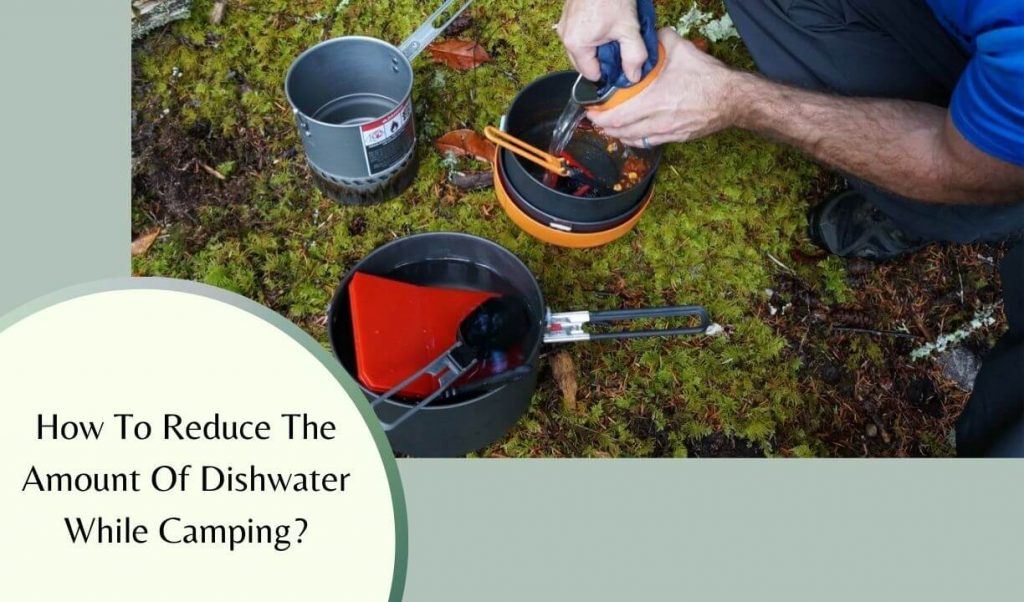If you are camping, then you need to know how to dispose of dishwater. There are many ways to dispose of dishwater. This post tells you the best way to dispose of dishwater, including what tools you will need and some handy techniques.
How To Dispose Of Dishwater While Camping?
First and foremost, you need to be absolutely sure that the dishwater is clean and does not contain food scraps. This will help prevent attracting animals and insects and ensure that the water is safe to use on plants around your campsite.
Although dishwater might be clean enough to use on your plant, you may still want to dispose of it in a location where it won’t hurt other wildlife and plants. You can either carry it out or dispose of it at a sanitation station if there is one available.
Where You Should Not Dispose Of Dishwater While Camping?
Before getting to the main topic, let’s discuss where you should not dispose of dishwater:
The River or Lake
You should not dump dishwater into the river or lake. Dumping the dishwater into the lake or river will pollute the water of the river or lake. Due to the lack of treatment, the waters will become unhygienic. You should always dispose of dishwater 200 feet away from this kind of natural source. So, you should not dump dishwater into the river or lake.
Into a toilet
If you pour dishwater down the toilet, the toilet may back up or overflow. And even if it does flush, you are putting your household plumbing at risk for clogs. If you have a septic system, pouring anything down the toilet other than human waste and toilet paper can cause problems.
Dishwashers aren’t garbage disposals, and they aren’t built to handle the same kind of load as disposal. Doing so can cause clogs and other issues with your drain and pipes.
Directly Into The Ground
If you do not have a garbage disposal, pouring dishwater into the ground may pollute the ground. So, never dispose of dishwater directly into the campground while camping.
Campground Water Spigot
Many campgrounds have water spigots. The Water spigot supply pure water for the camper. So, you should not dispose of dishwater there. Near some water spigot, the do not dump anything sign is put to prevent people from dumping dishwater there.
Also, do not wash your dish there. The water spigot has limited water and is only for drinking.

How To Reduce The Amount Of Dishwater While Camping?
So, how can we reduce the amount of dirty dishwater? It will be easier to dump less dishwater. It can be done simply by cutting down the use of water when washing the dishes.
Use Paper Plate & Glass
Using the Paper plate & glass dramatically reduces the amount of disposable dishwater. As you do not need to wash the paper plate & glass, you can save a lot of water for this purpose.
Warp Your Plate With Plastic
One way to save some time on dishwashing is to place plastic wrap over the plates before placing the food on the plate. This way, all of the food residue will be on the plastic wrap instead of on the plates themselves, so after the meal is over, you can simply throw the food wrap away, wipe the plates with a cloth.
Use A Damp Washcloth
You do not need to always wash your dishes. Sometimes you can just wipe them with a damp washcloth. Just wash the dishes which are really dirty.
Proper Ways To Dispose Of Dishwater While Camping
Now the good part comes finally. How to dispose of dishwater while camping?
Dig a Hole
The most proper way to dispose of dishwater while camping is by digging a hole. When the water is cool, you can dump it into the hole. You need to dig a 6-8 inches deep hole for this purpose.
After dumping the dishwater, you need to cover it with soil so that other animals or insects can not smell it and come near it.
Find Greywater Dumping Place
Many campsites have greywater dumping places. Greywater is the water from the washing machine, sink, and shower. You should pour dishwater into these places.
Conclusion
All the things we discussed above show how to dispose of dishwater while camping. Most of the time, campers just dump dishwater into the river or lake. You should avoid this and follow any one of the above methods. It will be good for you and good for the environment too!
Read How to Refill Fresh Water Tank during Camping





1 Comment
I am incessantly thought about this, thankyou for putting up.